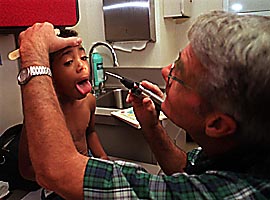 |
Friendships hard to keep

Gabi gets a checkup from Dr. Burris Duncan, in the pediatrics department of University Medical Center. Doctors monitor her growth closely.
![]() A stranger has come to call, and Gabi is curious.
A stranger has come to call, and Gabi is curious.
![]() She picks up her favorite book and asks the visitor to read.
She picks up her favorite book and asks the visitor to read.
![]() Climbing on the love seat, Gabi inches closer and closer until she presses up against the visitor's side. She peers through enormous glasses perched on her tiny nose, giggling at the brightly colored animals in her book.
Climbing on the love seat, Gabi inches closer and closer until she presses up against the visitor's side. She peers through enormous glasses perched on her tiny nose, giggling at the brightly colored animals in her book.
![]() Hoeft says her daughter has a difficult time making friends. "She has a hard time understanding boundaries," Hoeft said. "She wants to get into other kids' space. Fetal alcohol kids have a hard time keeping friends. They get too clingy."
Hoeft says her daughter has a difficult time making friends. "She has a hard time understanding boundaries," Hoeft said. "She wants to get into other kids' space. Fetal alcohol kids have a hard time keeping friends. They get too clingy."
![]() Gabi is in school at Project ABLE in the morning and at Children's World day care in the afternoons. The Department of Economic Security's Department of Developmental Disabilities pays for the day care.
Gabi is in school at Project ABLE in the morning and at Children's World day care in the afternoons. The Department of Economic Security's Department of Developmental Disabilities pays for the day care.
![]() Project ABLE is for preschoolers with special needs. Gabi attends the day care program "So she's around regular kids," Hoeft said.
Project ABLE is for preschoolers with special needs. Gabi attends the day care program "So she's around regular kids," Hoeft said.
![]() Hoeft knows it is time to start talking about critical issues with Gabi.
Hoeft knows it is time to start talking about critical issues with Gabi.
![]() She worries that Gabi could destroy her life if she were to drink alcohol, and knows she must never drink. "She's an addict, and she always will be. She started out life drunk."
She worries that Gabi could destroy her life if she were to drink alcohol, and knows she must never drink. "She's an addict, and she always will be. She started out life drunk."
![]() Hoeft also worries about Gabi having children of her own and hopes she will consider sterilization.
Hoeft also worries about Gabi having children of her own and hopes she will consider sterilization.
![]() "She should not have children," Hoeft said, "and I just don't see her taking birth control pills regularly.
"She should not have children," Hoeft said, "and I just don't see her taking birth control pills regularly.
![]() "Life for Gabi is going to be difficult enough without children," she added.
"Life for Gabi is going to be difficult enough without children," she added.
![]() Hoeft worries about what might happen if she were to become disabled or die. She knows Gabi would never be able to live on her own.
Hoeft worries about what might happen if she were to become disabled or die. She knows Gabi would never be able to live on her own.
![]() With help from the Home of Their Own program, Hoeft bought a house on the Southeast Side. The state program keeps disabled people out of institutions. Hoeft received a low-interest loan and help with the down payment.
With help from the Home of Their Own program, Hoeft bought a house on the Southeast Side. The state program keeps disabled people out of institutions. Hoeft received a low-interest loan and help with the down payment.
![]() The house belongs to Gabi, her 17-year-old adopted brother, and a 3-year-old boy with Down syndrome whom Hoeft is adopting. If Hoeft were to become unable to care for the three, the state would provide care in the home.
The house belongs to Gabi, her 17-year-old adopted brother, and a 3-year-old boy with Down syndrome whom Hoeft is adopting. If Hoeft were to become unable to care for the three, the state would provide care in the home.
![]() "Gabi will be able to live here with support. They will never have to move. This is their home."
"Gabi will be able to live here with support. They will never have to move. This is their home."
![]() Hoeft is doing everything she can to help Gabi make it through life later.
Hoeft is doing everything she can to help Gabi make it through life later.
![]() "I'm afraid she will be very vulnerable as an adult," Hoeft said. "I'm hoping I can ensure she's going to get her needs met."
"I'm afraid she will be very vulnerable as an adult," Hoeft said. "I'm hoping I can ensure she's going to get her needs met."
